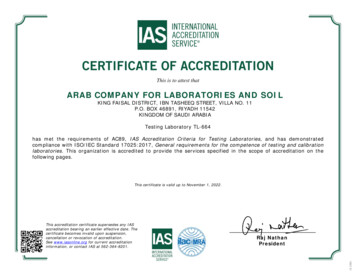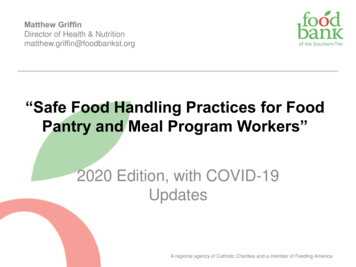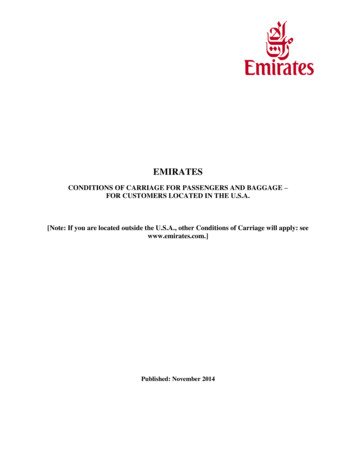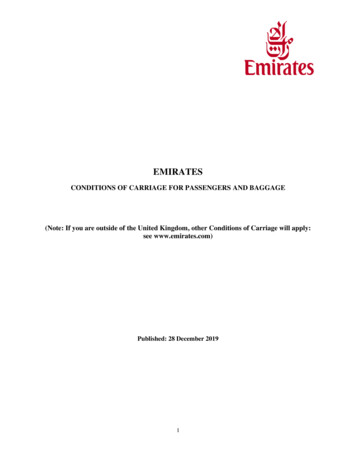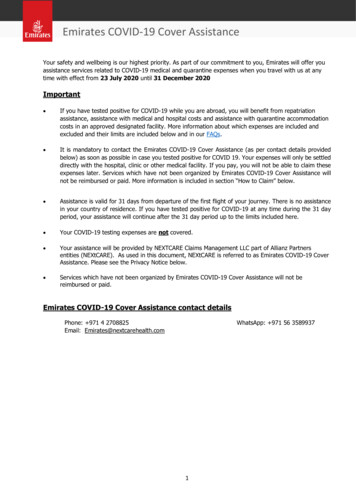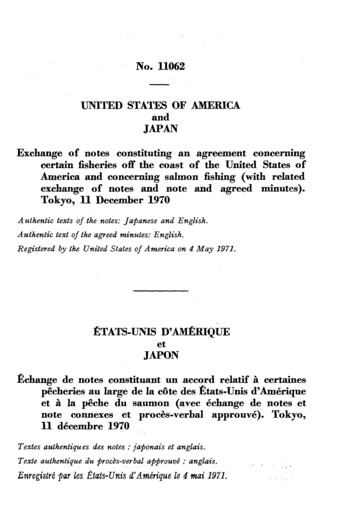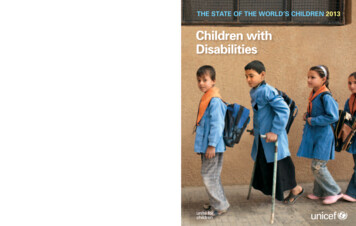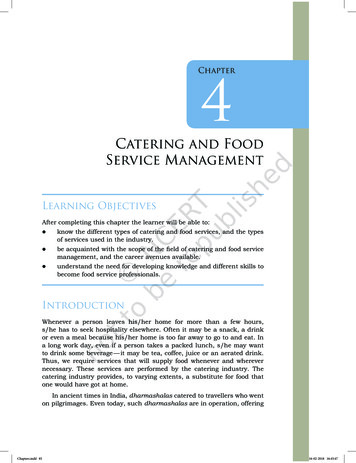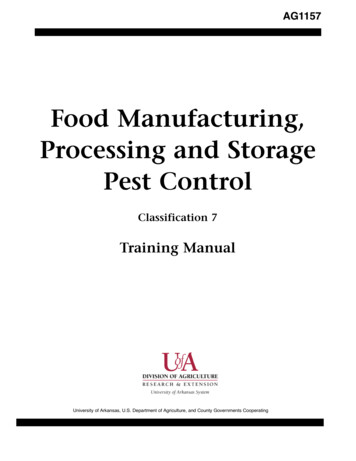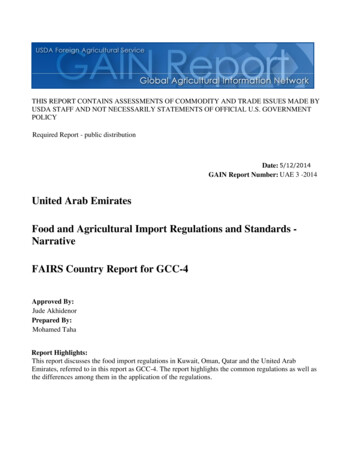
Transcription
THIS REPORT CONTAINS ASSESSMENTS OF COMMODITY AND TRADE ISSUES MADE BYUSDA STAFF AND NOT NECESSARILY STATEMENTS OF OFFICIAL U.S. GOVERNMENTPOLICYRequired Report - public distributionDate: 5/12/2014GAIN Report Number: UAE 3 -2014United Arab EmiratesFood and Agricultural Import Regulations and Standards NarrativeFAIRS Country Report for GCC-4Approved By:Jude AkhidenorPrepared By:Mohamed TahaReport Highlights:This report discusses the food import regulations in Kuwait, Oman, Qatar and the United ArabEmirates, referred to in this report as GCC-4. The report highlights the common regulations as well asthe differences among them in the application of the regulations.
Section I. Food Laws:DISCLAIMER: The Office of Agricultural Affairs (OAA) in Dubai, UAE, has prepared this report forU.S. exporters of domestic food and agricultural products. While every possible care has been taken inpreparing the report, the information provided might be dated, as some import requirements are subjectto frequent change. It is highly recommended that U.S. exporters ensure that all necessary customsclearance requirements have been verified with local authorities through your foreign importer beforesales are finalized. Final import approval of any product is always subject to the rules and regulations ofthe importing country as interpreted at the time of product entry.Section I. Food Laws:The Office of Agricultural Affairs in Dubai covers Kuwait, Qatar, Oman and the United Arab Emirates(UAE), referred to as GCC-4 in this report. GCC-4 in addition to Saudi Arabia and Bahrain comprisesthe Gulf Cooperation Council (GCC) with shared boarders with member states depending on imports tofill the gap between their limited food production and the demand of increasing population.Food Standards: The Gulf Standards Organization (GSO), comprising of the 6 GCC countries andYemen, is responsible for developing food and non-food standards in the GCC. Chaired by Qatar, theGSO food standards committee has been working to harmonize existing GCC standards within theguidelines of the Codex Alimentarius, ISO and other international organizations. However, in somecases, differences still exist between some of the proposed new standards and existing internationalguidelines. Nearly 1200 food and food related technical regulations and standards have been developedby the GSO since its creation in 2001.The GCC-4 countries import as much as 90 percent of their food requirements due to unfavorableagriculture production conditions in the region. Thus, they are continuously working to improve notonly their standards developments, but also the application of such food regulations.The GSO shelf life and labeling technical regulations (TR) are considered the backbone of food importregulations. The first version of the standards was published in the nineties. They were revised in 2007to be more harmonized with those of Codex and other international organizations. Further improvementwas made to the 2013 version which is yet to be officially implemented. The revised version offersmore flexible requirements for importing food products and splits the shelf life standard into thefollowing 2:1. GSO 150 Part I/2013 Technical Regulation “Expiration dates for food products – Par I:Mandatory expiration dates for 56 food item (baby food, dairy products, meat & poultry, eggs,and seafood;2. GSO 150 Part II/2013 Standard “Expiration dates for food products – Par II” Voluntaryexpiration dates for food products. This standard includes suggested shelf life for many productsand a list of exempted food items.Copies of any standard or TR may be purchased directly from the GSO website www.gso.org.sa
The GSO has created 3 subcommittees to follow-up on food related issues:1. Bio-technology and organic food subcommittee that is chaired and hosted by the UAE2. Food labeling subcommittee that is chaired and hosted by Oman.3. Additives subcommittee that is chaired and hosted by Saudi ArabiaThe GSO also, as necessary, forms working groups to address specific issues.In theory, each GCC member country should notify the WTO of any proposed new standard.Interested parties who review these notifications should bear in mind that, while a notification may besubmitted by a single GCC member, the proposed standard will eventually apply to all GCC membercountries. Once a new standard is approved by the GSO food standards committee, each membercountry officially adopts the standard, thus making it a national standard as well as a GSO standard.Each GCC-4 member state develops its national food law which addresses all food related subjects,including import, local production, food establishments, restaurants, retailing, etc . GSO food relatedtechnical regulations and standards are usually the reference food import related sections.The regulations become enforceable only after they have been officially announced via a ministerialdecree published in the official gazettes in each country. Usually, a grace period is granted from the dateof issuance in the official gazette prior to full enforcement of new regulations.Concerned health authority in the respective GCC-4 countries may recommend a temporary ban onimports of food products from countries in which food health hazard has been identified.Generally, minor compliance disputes may be settled by providing a letter confirming that such mistakewill be avoided in the future. Other bigger disputes are discussed among concerned national food safetycommittees. To facilitate product entry, the U.S. suppliers are strongly encouraged to work closely withthe local importer to obtain advance label approval, particularly for new-to-market products to ensurethat the exported U.S. products comply with local food regulations/standards.Customs and Tariffs: In January 2003, the “GCC Unified Customs Law and Single Customs Tariff”(UCL) was released. While the UCL established a unified customs tariff of five percent on nearly allfood products, some food products such as live animals, fresh fruits and vegetables, some seafood,grains, flour, tea, sugar, spices and seeds for planting are exempt from tariffs. It also established a singleentry point policy. In other words, a product entering any GCC member market would be charged theappropriate customs duty only at the point of entry and would then be permitted duty free transit amongGCC member countries. In practice, this policy is employed only with unopened containerstransshipped between GCC markets. Partial shipments tend to be subject to the five percent import dutyagain in the country of destination. However, it is expected that all goods, even partial shipments fromopened containers, will eventually receive single-entry treatment once customs procedures are fullyunified.
Food Import Procedures: In 2007, the GCC Food Safety Committee developed a “Guide for FoodImport Procedures for the GCC Countries.” This guide is meant to unify the applied procedures forclearing food consignments, as well as to unify the required import certificates for different types offoods. The intent was to facilitate the movement of food products within the GCC once customsunification is fully implemented. The final version of the import procedure was completed in 2013 andthe GCC member countries will complete the application mechanism before June 2014. Soft applicationof this import procedure is expected within the second half of 2014. Parallel to this several trainingworkshops for the food import control personnel will be conducted for food import inspectors. GCCcountries expect to face some hurdles in the beginning, but they plan to address such hurdles when theysurface.UAE DevelopmentsThe Emirates Authority for Standardization and Metrology (ESMA) is the responsible body, incooperation with other members of the GSO, for either developing or adopting all standards. Seniorofficials from ESMA represent the UAE at GSO meetings.The Ministry of Environment and Water (MOEW) is responsible for establishing and enforcing foodsafety regulations and laws based on recommendations from the GSO and the National Food SafetyCommittee (NFSC) on food related matters, and by the Veterinary Committee (VC) on meat and poultryrelated matters. The MOEW is also the coordinating body between the eight municipalities of otherUAE federal entities.The National Food Safety Committee (NFSC) consists of:- Two representatives each from the Abu Dhabi, Dubai and Sharjah municipalities.- One representative each from the remaining five municipalities of the UAE.- One representative each from the Ministries of Foreign Affairs, Economy & Planning, Environmentand Water Resources and Health.- One representative from ESMA.- One representative from Al Ain University.The Veterinary Committee (VC) consists of:1- One representative from the veterinary section of the eight municipalities of the UAE.- - One representative from the Animal Wealth Department, Ministry of Environment and Water.In each of the country’s eight municipalities the respective health department is responsible forenforcing the federal food safety standards on locally produced and imported foods through its foodcontrol section. The representatives of the eight food control sections of the emirates meet regularly todiscuss and coordinate issues of mutual interests and share information. Yet, each operatesindependently. The Emirates of Dubai, Abu Dhabi, and Sharjah are the major entry points for importedfood products, in descending order of trade volume and value. Food is also imported via other land andsea ports, but in smaller volumes. Occasionally, municipalities act independently when enforcingregulatory requirements, which can be disruptive to trade if proper prior notice is not provided.
Food products are regularly inspected at the time of entry, at production facilities and at the point-ofsale. Fines are levied and products destroyed for severe violations. Imported and locally produced foodproducts are subject to the same food safety regulations and labeling requirements. At present there areno environmental laws regulating food product packaging.Most UAE food safety officials work closely with local food importers to ensure that food andagricultural imports are not unduly disrupted or delayed at ports of entry. In cases where OAA Dubaihas been asked to facilitate the clearance of detained shipments, officials have often cooperated to find afair resolution of the issue. However, greater transparency in the regulatory system and broaderdissemination of regulatory changes could further reduce the number of detained shipments. As ageneral rule, Abu Dhabi prefers to import food directly through its ports rather than have it transshippedfrom other emirates. Exporters are encouraged to consult closely with importers on productrequirements prior to shipment.Among the 7 emirates of the UAE, only the Emirate of Dubai requires that all food products importedthrough their entry points be registered and labels are pre-approved by the local health department.Kuwait DevelopmentsThe Department of Standards and Metrology, Public Authority for Industry (PAI), in cooperation withother concerned departments, including the Kuwait Municipality (KUM), the Ministry of Public Health(MOPH), the Ministry of Commerce and Industry (MOCI), the Public Authority for Agricultural Affairsand Fish Resources (PAAFR), the Consumer Protection of the Ministry of Commerce, Customs,Chamber of Commerce and the Kuwait Institute for Scientific Research (KISR) constitute the “NationalFood Safety Committee” which is responsible for establishing local food safety regulations.Regulatory enforcement is divided between the KUM, MOPH and PAAFR. The Imported FoodDepartment within KUM has responsibility for the initial inspection of imported food products,including verification of compliance with label requirements and collection of samples for laboratoryanalysis by MOPH. In general, new-to-market products and products that have failed previousinspection are subject to thorough inspection. Laboratory tests typically take 1-4 weeks depending onthe type of test, which, at times, can limit the remaining shelf life for perishable products once cleared.Compliance disputes are handled by the Food Committee which is comprised of representatives fromthe KUM, MOPH, PAI, PAAFR, KISR and the Kuwait Chamber of Commerce and Industry. Thecommittee determines the validity of a complaint and could order re-inspection if warranted. Tradecontacts report that consignments with minor labeling infractions may be granted a one-time waiverprovided the products are found to be completely safe for human consumption. Rejected shipments areallowed one month to be re-exported.Oman DevelopmentsThe Directorate for Specifications and Measurements (DSM), Ministry of Commerce and Industry(MOCAI), represent Oman at GSO and is responsible for formulating food safety regulations andstandards. The Health Department of the Ministry of Regional Municipalities and Water represent
Oman at the GCC Food Safety Committee.Regulatory enforcement of food products is divided between the Ministry of Agriculture (MOA), theMinistry of Health (MOH) and the various municipalities within the Sultanate of Oman. MOA isresponsible for inspecting imported and locally produced live animals and plants, red meats, poultrymeat, table egg, dairy products, agricultural materials, timber, grains, fresh fruits and vegetables andother unprocessed agricultural products. The Health Quarantine Department within MOH is responsiblefor the inspection of imported semi- and fully processed food products, including sugar. Localgovernment or “municipalities” may post officials at ports of entry, but their role in inspection ofimported foods is very marginal. The municipalities are primarily involved in the inspection of productsavailable in local wholesale and retail markets.Oman is currently working on consolidating its food safety authorities under
appropriate customs duty only at the point of entry and would then be permitted duty free transit among GCC member countries. In practice, this policy is employed only with unopened containers transshipped between GCC markets. Partial shipments tend to be subject to the five percent import duty again in the country of destination. However, it is expected that all goods, even partial shipments from

